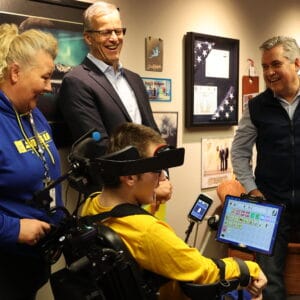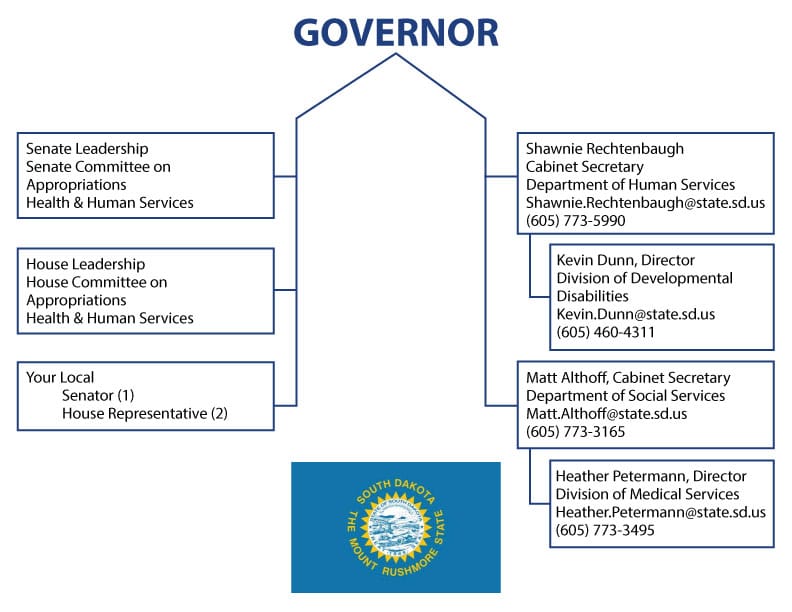New - Urgent Request for Advocates
Right now, the state of South Dakota is looking to change a rule that allowed LifeScape to be reimbursed for Medicaid outpatient services of a suggested standard Medicaid practice.
It’s a rule that’s been in place for the last 39 years.
That standard Medicaid reimbursement practice often fails to reflect the nuanced and resource-intensive nature of pediatric care, particularly for children with complex medical needs; hence the rule designed to protect LifeScape and other providers from the negative consequences this new direction would generate.
Meaning, this would materially reduce the reimbursement of our outpatient services, putting hundreds of family’s services at risk.
We are asking you to support LifeScape in opposing the changes being suggested to that 39-year old rule, that would allow the Secretary of the Department of Social Services to determine our fate without consideration for those families and their 3,316 children supported last year throughout the state of South Dakota.
NOTICE OF PUBLIC HEARING
Department of Social Services Notice of Public Hearing to Adopt Rules A public hearing will be held in the Department of Social Services Building, Oak Conference Room B110A, 1501 S Highline Ave, Sioux Falls, SD 57110, on Wednesday, September 10, 2025, at 11:00 a.m. Central Time, to consider the adoption and amendment of proposed Administrative Rules
Persons interested in presenting amendments, data, opinions, and arguments for or against the proposed rules may:
- Appear in-person at the hearing.
- May attend telephonically by calling (605) 679-7263 and using conference code 310 934 216#
- Mail them to Teresa Schulte, Administrative Rules C219, Department of Social Services, 1501 S Highline Ave, Sioux Falls, SD 57110
- Email them to DSSAdminRules@state.sd.us
You can also contact the following about your concerns:
Governor Larry Rhoden
Phone: (605) 773-3212
Email: gov@state.sd.us
Rules Review Committee
- Chair: Rep. Jon Hansen
Phone: (605) 773-3851
Email: Jon.Hansen@sdlegislature.gov - Vice-Chair: Sen. Taffy Howard
Phone: (605) 773-3821
Email: Taffy.Howard@sdlegislature.gov - Members
- Rep. Roger DeGroot
Phone: (605) 773-3851
Email: Roger.DeGroot@sdlegislature.gov - Rep. Erik Muckey
Phone: (605) 999-5036 or (605) 773-3851
Email: Erik.Muckey@sdlegislature.gov - Sen. Liz Larson
Phone: (605) 310-3317 or (605) 773-3821
Email: Liz.Larson@sdlegislature.gov - Sen. Jim Mehlhaff
Phone: (605) 280-3274 or (605) 773-3821
Email: Jim.Mehlhaff@sdlegislature.gov
- Rep. Roger DeGroot
Learning About Advocacy
LifeScape would like to share opportunities and updates related to issues involving advocacy.
Advocating for yourself or a loved one can be tough. It’s hard to know where to start, and you often must explain your concerns to many people, multiple times. Change is difficult, and asking others to think differently can be overwhelming. But in the end, advocacy can make a real difference, helping you or someone you love live their best life.
- There are many ways to advocate:
- You can send a letter or email
- Tell your story live during a legislative session or via Zoom
- Talking to legislators 1:1
Here’s an example of the good that can be accomplished by advocating. A Senate Resolution was passed in both the Senate and House in 2025, requiring the legislature to use person-centered language when constructing and reviewing all laws moving forward.
This happened, because an individual with a disability reached out to their local state senator asking that this be made a priority. They, along with family members and others testified as well and it passed! A prime example of what advocacy can do!
Click here or check out the dropdown below called Suggestions for Legislative Testimony to see a testimonial suggestion.
Would you like to see the latest resolution pertaining to understanding person-centered language?
Understanding how the system works.
When advocating for issues surrounding the topic of disability, you will most likely want to be changing policy or funding mechanisms.
All of this is overseen by the Center for Medicaid and Medicare (CMS) which is part of the federal government. CMS then works with the local state offices, Department of Human Services (DHS), and Department of Social Services (DSS) which oversees Medicaid qualification and reimbursement.
Under DHS is the Division of Disabilities (DD) which has the day-to-day oversight of managing and implementing disability services.
Lastly, there is your Conflict Free Case Manager and the service provider who actually provide the services.
The video below walks you through how the process works.
Who you'll need to talk to.
Directory of people you most likely will talk to.
Senate
Leadership
Speaker Pro Tem – Chris Karr (District 11)
(605) 695-0391
Chris.Karr@sdlegislature.gov
Majority Leader – Jim Mehlhaff (District 24)
(605) 280-3274
Jim.Mehlhaff@sdlegislature.gov
Assistant Leader – Carl Perry (District 3)
(605) 525-1876
Carl.Perry@sdlegislature.gov
Whips:
Sue Peterson (District 13)
(605) 371-1668
Sue.Peterson@sdlegislature.gov
Kevin Jensen (District 16)
(605) 366-6947
Kevin.Jensen@sdlegislature.gov
Randy Diebert (District 31)
(605) 722-8133
Randy.Diebert@sdlegislature.gov
Tom Pischke (District 25)
(605) 999-2948
Tom.Pischke@sdlegislature.gov
Committee on Appropriations
Chair – Ernie Otten (District 6)
(605) 261-6305
Ernie.Otten@sdlegislature.gov
Vice Chair – Mark Lapka (District 23)
(605) 216-1625
Mark.Lapka@sdlegislature.gov
John Carley (District 29)
(605) 962-6145
John.Carley@sdlegislature.gov
Red Dawn Foster (District 27)
(605) 515-1668
RedDawn.Foster@sdlegislature.gov
Taffy Howard (District 34)
(605) 301-0593
Taffy.Howard@sdlegislature.gov
Paul Miskimins (District 20)
(605) 773-3821
Paul.Miskimins@sdlegislature.gov
Glen Vilhauer (District 5)
(605) 868-3239
Glen.Vilhauer@sdlegislature.gov
Mykala Voita (District 21)
(605) 830-1355
Mykala.Voita@sdlegislature.gov
Larry Zikmund (District 14)
(605) 373-0975
Larry.Zikmund@sdlegislature.gov
Health & Human Services
Chair – Kevin Jensen (District 16)
(605) 366-6947
Kevin.Jensen@sdlegislature.gov
Vice Chair – Sydney Davis (District 17)
(605) 770-7029
Sydney.Davis@sdlegislature.gov
Tamara Grove (District 26)
(605) 321-3812
Tamara.Grove@sdlegislature.gov
Carl Perry (District 3)
(605) 626-1876
Carl.Perry@sdlegislature.gov
Tim Reed (District 7)
(605) 691-0452
Tim.Reed@sdlegislature.gov
Jamie Smith (District 15)
(605) 351-4733
Jamie.Smith@sdlegislature.gov
Curt Voight (District 33)
(605) 209-7073
Curt.Voight@sdlegislature.gov
House of Representatives
Leadership
Speaker – Jon Hansen (District 25)
Speaker Pro Tem – Karla Lems (District 16)
Majority Leader – Scott Odenbach (District 31)
Scott.Odenbach@sdlegislature.gov
Assistant Leader – Marty Overweg (District 21)
Marty.Overweg@sdlegislature.gov
Whips:
Bethany Soye (District 9)
Bethany.Soye@sdlegislature.gov
Greg Jamison (District 12)
Greg.Jamison@sdlegislature.gov
Jessica Bahmuller (District 19)
Jessica.Bahmuller@sdlegislature.gov
Les Heinemann (District 25)
Les.Heinemann@sdlegislature.gov
Brandei Schaefbauer (District 3)
Committee on Appropriations
Chair – Mike Derby (District 34)
Vice Chair – Tony Venhuizen (District 13)
Tony.Venhuizen@sdlegislature.gov
Terri Jorgenson (District 29)
Terri.Jorgenson@sdlegislature.gov
Chris Kassin (District 17)
Chris.Kassin@sdlegislature.gov
Liz May (District 27)
Scott Moore (District 23)
Erik Muckey (District 15)
Al Novstrup (District 3)
John Sjaarda (District 2)
Health & Human Services
Chair – Brian Mulder (District 11)
Brian.Mulder@sdlegislature.gov
Vice Chair – Les Heinemann (District 25)
Les.Heinemann@sdlegislature.gov
Bobbi Andera (District 10)
Bobbi.Andera@sdlegislature.gov
Heather Baxter (District 34)
Heather.Baxter@sdlegislature.gov
Eric Emery (District 26A)
Josephine Garcia (District 5)
Josephine.Garcia@sdlegislature.gov
Jim Halverson (District 21)
Jim.Halverson@sdlegislature.gov
Dylan Jordan (District 4)
Dylan.Jordan@sdlegislature.gov
Tony Kayser (District 14)
Logan Manhart (District 1)
Logan.Manhart@sdlegislature.gov
Rebecca Reimer (District 26B)
Rebecca.Reimer@sdlegislature.gov
Taylor Rehfeldt (District 14)
Taylor.Rehfeldt@sdlegislature.gov
Brandei Schaefbauer (District 3)
Suggestions for Legislative Testimony
- When called to testify by the chair, be prepared to start immediately.
- Acknowledge and thank the chair and committee for their time.
- Introduce yourself: I am _____, the (parent/guardian) of _____.
- Brevity is always better.
- Stay on point. It’s best to write down your testimony as clear and short as possible. It’s vital you do not just start talking.
- 1 – 2 sentences of history to help the committee better understand the person you represent.
- 1 – 2 sentences of what the problem is.
- 1 -2 sentences of what the solution or best outcome would look like.
- A few sentences helping the committee understand why the problem exists and how they can help solve it.
- In closing, ask for their help and offer to be available to answer any further questions.
- The chair will manage the conversation, so only respond to questions that the chair approves.
- Committees appreciate people with passion, but they also are looking for respectful and factual driven conversations. Too much of the human element will most likely not end well.
- Visuals can be used, but getting them up and running will eat into your presentation time, so use them very carefully and only if truly needed to prove a point.
- Your time will be limited (HHS committee is usually 3 minutes!)
- You can respectfully ask for more time, but given their agendas, you may only gain another minute or so.
- You can submit a broader written testimony prior to the hearing. That is a great way to get more facts and points of interest on the table. The goal is to get the legislator to ask your questions on their time, not yours.
- Always end with a genuine and humble thank you to the chair and the committee.
- The committee will then take on the issue with further discussion and possible questions back to you, so be ready. The committee will then make a motion to pass or kill the bill and vote.
- They front on public reaction to the outcome. You can thank them later if the vote goes your way.
- Consider sending a thank you note a few days to a week later to the entire committee as it now has to go to the Senate or House floor for the bigger vote.
- Floor vote requires 51% of the vote for policy and 67% of the vote for funding. This takes a lot conversations with members of House and Senate.
- The process repeats on the other side of the floor.
- Having others able to present their similar views is important. Associations are a great way to approach this.
- Reaching out to your representatives prior to the testimony, asking for their advice, asking for their support is important.
Advocacy in Action





